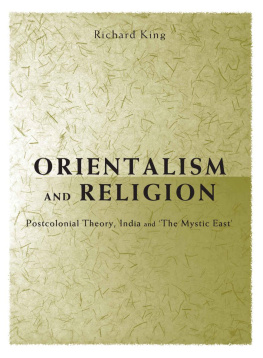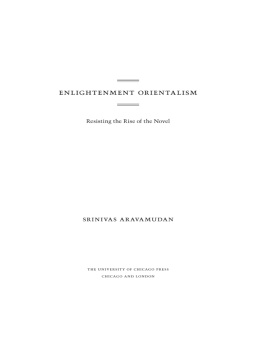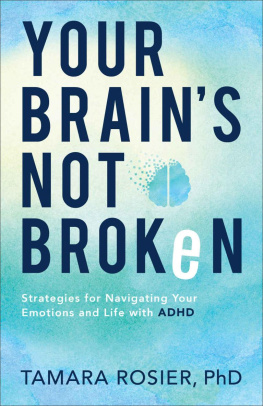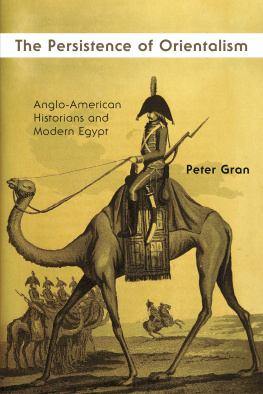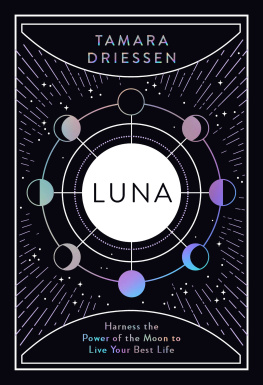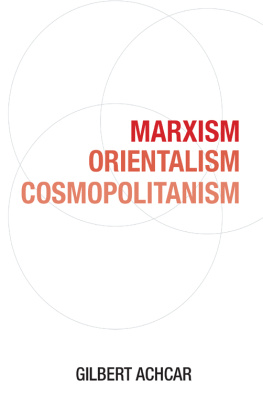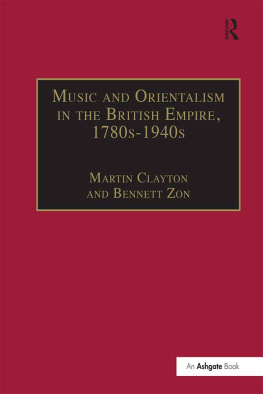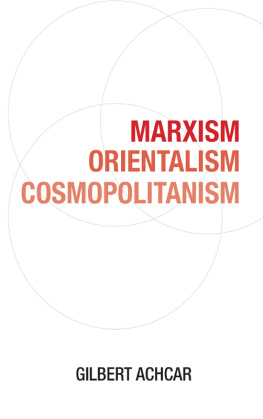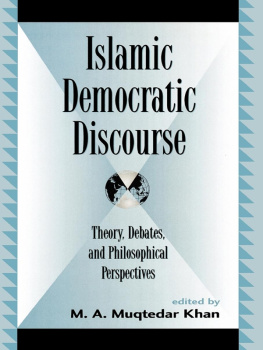Tamara Sonn - Overcoming Orientalism
Here you can read online Tamara Sonn - Overcoming Orientalism full text of the book (entire story) in english for free. Download pdf and epub, get meaning, cover and reviews about this ebook. year: 2021, publisher: Oxford University Press, genre: Politics. Description of the work, (preface) as well as reviews are available. Best literature library LitArk.com created for fans of good reading and offers a wide selection of genres:
Romance novel
Science fiction
Adventure
Detective
Science
History
Home and family
Prose
Art
Politics
Computer
Non-fiction
Religion
Business
Children
Humor
Choose a favorite category and find really read worthwhile books. Enjoy immersion in the world of imagination, feel the emotions of the characters or learn something new for yourself, make an fascinating discovery.

- Book:Overcoming Orientalism
- Author:
- Publisher:Oxford University Press
- Genre:
- Year:2021
- Rating:3 / 5
- Favourites:Add to favourites
- Your mark:
- 60
- 1
- 2
- 3
- 4
- 5
Overcoming Orientalism: summary, description and annotation
We offer to read an annotation, description, summary or preface (depends on what the author of the book "Overcoming Orientalism" wrote himself). If you haven't found the necessary information about the book — write in the comments, we will try to find it.
Overcoming Orientalism — read online for free the complete book (whole text) full work
Below is the text of the book, divided by pages. System saving the place of the last page read, allows you to conveniently read the book "Overcoming Orientalism" online for free, without having to search again every time where you left off. Put a bookmark, and you can go to the page where you finished reading at any time.
Font size:
Interval:
Bookmark:
Edited by
TAMARA SONN


Oxford University Press is a department of the University of Oxford. It furthers the Universitys objective of excellence in research, scholarship, and education by publishing worldwide. Oxford is a registered trade mark of Oxford University Press in the UK and certain other countries.
Published in the United States of America by Oxford University Press
198 Madison Avenue, New York, NY 10016, United States of America.
Oxford University Press 2021
All rights reserved. No part of this publication may be reproduced, stored in a retrieval system, or transmitted, in any form or by any means, without the prior permission in writing of Oxford University Press, or as expressly permitted by law, by license, or under terms agreed with the appropriate reproduction rights organization. Inquiries concerning reproduction outside the scope of the above should be sent to the Rights Department, Oxford University Press, at the address above.
You must not circulate this work in any other form and you must impose this same condition on any acquirer.
Library of Congress Cataloging-in-Publication Data
Names: Sonn, Tamara, 1949- editor. |
Title: Overcoming Orientalism : essays in honor of John L. Esposito /
Tamara Sonn.
Description: New York : Oxford University Press, 2021. |
Includes bibliographical references and index.
Identifiers: LCCN 2020056493 (print) | LCCN 2020056494 (ebook) |
ISBN 9780190054151 (hardback) | ISBN 9780190054175 (epub)
Subjects: LCSH: Orientalism. | Islamophobia. | Religious tolerance.
Classification: LCC DS61.85 .O84 2021 (print) | LCC DS61.85 (ebook) |
DDC 303.48/2182105dc23
LC record available at https://lccn.loc.gov/2020056493
LC ebook record available at https://lccn.loc.gov/2020056494
ISBN 9780190054151
DOI: 10.1093/oso/9780190054151.001.0001
[B]ooks... contain a potency of life in them to be as active as that soul was whose progeny they are; nay they do preserve as in a vial the purest efficacy and extraction of that living intellect that bred them.
John Milton, Areopagitica (1644)
Transliteration style has been left to the discretion of the contributors; some incorporate full diacriticals in accordance with standard International Journal of Middle East Studies style while others use a simplified version, noting only the ayn () and hamza (). The text uses Gregorian calendar dates, and place names are given in familiar anglicized forms (such as Mecca rather than Makka and Cairo instead of al-Qahira).
Tamara Sonn
Karen Armstrong
Nader Hashemi
Khairudin Aljunied
Asma Afsaruddin
Sohail H. Hashmi
Imtiyaz Yusuf
Jordan Denari Duffner
Sahar Aziz
Scott C. Alexander
Peter Mandaville
Mohammad Fadel
Tamara Sonn
In the context of Europes colonialism, programs in Asian studies were developedtermed Oriental or Eastern, because the geographic location of many of the subjects covered lay east of Europe, although others lay to the south, including North Africa. Beginning in the late eighteenth and early nineteenth centuries and flourishing well into the twentieth, the field produced careful philological studies of classical texts that contributed significantly to Europeans awareness of non-European languages and literatures.
However, as Burke notes, Orientalism could not be understood apart from the circumstances of its production. These included modern (Enlightenment) Europes self-image as uniquely rational and civilized and its imperialist sense of entitlement to the resources and markets of non-Europeans. These perceptions inevitably crept into Orientalist interpretations of non-European societies, frequently producing disparaging analyses of the Oriental Other. French Orientalist Ernest Renans description of Islam in an 1883 lecture at the Sorbonne is paradigmatic:
Anyone with even the slightest education in matters of our time sees clearly the current inferiority of Muslim countries, the decadence of states governed by Islam, the intellectual sterility of races that derive their culture and education from that religion alone. All who have been to the Orient or to Africa are struck by what is the inevitably narrow-mindedness of a true believer, of a kind of iron ring around his head, making it absolutely closed to science, making it absolutely incapable of learning anything or of opening itself up to any new idea. From the beginning of his religious initiation... the Muslim child... becomes fanatical, full of a foolish pride in possessing what he believes is the absolute truth, happy with what determines
Renan perhaps was unaware of the extraordinary contributions to the sciences made by Muslims, including Arabic numerals and the advanced mathematics they facilitated (algebra and algorithm both have Arabic roots), but he was no doubt aware of Frances vast imperial enterprises in Muslim lands. France had invaded Egypt in 1798, claimed control of Algeria in 1830, intervened in Syria in the 1860s, and established dominance over Tunisia in the 1880s, for example. In the view of contemporary critics of Orientalism, the combination of Enlightenment arrogance and colonialist concerns inevitably influenced Orientalists evaluations of those who would become their subjects.
Criticism of European scholars of Islam did not begin with Edward Said, but his 1978 Orientalism became the classic of the genre. Employing anti-colonial analytical frameworks that linked the scholars (and artists) products with the political power structures in which they worked, Said characterized Orientalism not as a discipline but an ideology or, more precisely, an ideological discourse whose participants inevitably reflect the political-economic objectives of the governments under which they live. In Saids presentation, Orientalists are incapable of doing otherwise. In effect, therefore, they provide rationales for those very objectives.
The unidimensional nature of Saids portrayal of Orientalism was subjected to serious criticism; it left no room for independent thought and scarcely acknowledged the enormous contributions of numerous scholars of antiquity. Nevertheless, its impact was so profound that the term Orientalism has had a decisively negative connotation ever since. There remain a great many European and American scholars of Asian languages and literatures, but none embrace the title Orientalist. Even the revered University of London School of Oriental and Arabic Studies, established in 1916when Britain still controlled Egypt, Sudan, Nigeria, and the Indian subcontinent and was in the midst of a war that would result in its consolidation of control over Palestine, Jordan, and Iraqnow goes simply as SOAS.
That negative connotation of Orientalism is the one intended in the title of this Festschrift in honor of John L. Esposito, certainly the best-known scholar of Islam in North America and, in scholarly circles, perhaps the world. His sheer productivity would ensure as much. He has not only published more extensively than his peers (over seventy books; see John L. Esposito: Select Bibliography in this volume) but has established a series of handbooks, encyclopedias, and a dictionary that have become standard academic reference works. Recipient of countless scholarly awards, he has also provided tireless academic leadership, serving as president of the American Council for the Study of Islamic Societies (19891991), the Middle East Studies Association (1990), and the American Academy of Religion (2013). And as this volume demonstrates, he has been an inspiring educator. As of this writing, he has been teaching for nearly fifty years.
Font size:
Interval:
Bookmark:
Similar books «Overcoming Orientalism»
Look at similar books to Overcoming Orientalism. We have selected literature similar in name and meaning in the hope of providing readers with more options to find new, interesting, not yet read works.
Discussion, reviews of the book Overcoming Orientalism and just readers' own opinions. Leave your comments, write what you think about the work, its meaning or the main characters. Specify what exactly you liked and what you didn't like, and why you think so.

